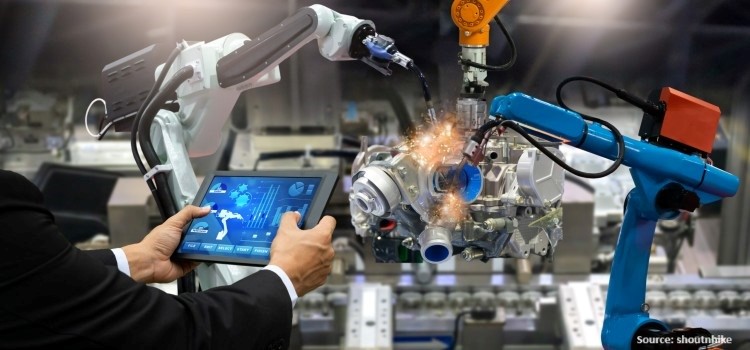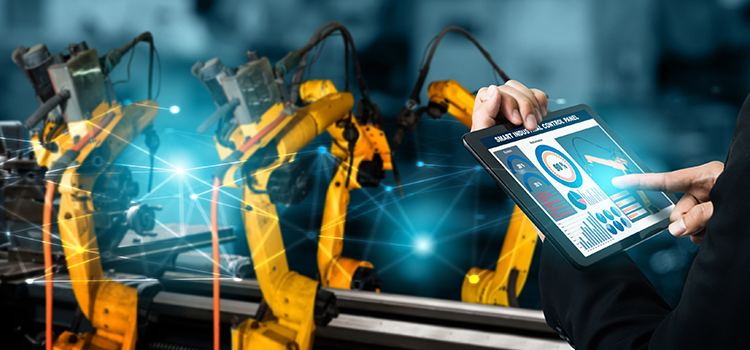
Asia-Pacific Industrial Process Automation Market by Component (Manufacturing Execution System (MES), Distributed Control System (DCS), Programmable Logic Control (PLC), Supervisory Control & Data Acquisition (SCADA), by End user (Oil & Gas, Chemicals & Refining, Energy & Power, Pulp & Paper, Metals & Mining, Pharmaceutical, Cement & Glass, and Others) – Opportunity Analysis and Industry Forecast, 2023–2030
Industry: Semiconductor & Electronics | Publish Date: 09-Nov-2023 | No of Pages: 196 | No. of Tables: 151 | No. of Figures: 95 | Format: PDF | Report Code : N/A
Market Definition
Asia-Pacific Industrial Process Automation Market was valued at USD 15.03 billion in 2022, and is predicted to reach USD 28.83 billion by 2030, with a CAGR of 7.12% from 2023 to 2030. Industrial process automation refers to the use of computer technology, along with hardware to control & monitor industrial processes such as inventory management, manufacturing, and production of goods.
It involves the integration of various technologies and systems, such as sensors, programmable logic controllers (PLCs), human-machine interfaces (HMIs), and supervisory control & data acquisition (SCADA) systems, to streamline and optimize production processes including quality control, assembling, testing & inspection, packaging & labeling.
Process automation is applied to a wide range of industries, including oil & gas, chemical processing, food & beverage, and pharmaceuticals, among others. The goal of process automation is to improve efficiency, quality, and safety while reducing costs & minimizing human error.
Thus, industrial process automation plays a significant role in modern manufacturing & production, enabling companies to operate more efficiently, produce higher-quality products, and create safer working environments for their employees when compared to traditional manual methods.
Driving Market Growth: Automation Adoption Across Key Industries
The increasing implementation of automation in sectors such as oil & gas, pharmaceuticals, food & beverages, power generation, and chemicals is a significant driver for the overall market growth. This trend is propelled by the need for improved efficiency, quality control, and cost-effectiveness in these industries.
Automation solutions streamline processes, enhance productivity, and ensure consistent product quality, making them essential for staying competitive and meeting evolving market demands. As a result, the industrial process automation market continues to expand as various sectors recognize the benefits of automation in optimizing their operations.
Fueling Growth: Industry 4.0 Adoption Drives Demand for Real-time Industrial Process Automation
The rising adoption of Industry 4.0 principles in countries such as India, South Korea, and Indonesia is spurring a growing demand for industrial process automation systems. These systems provide real-time monitoring and control of industrial processes, enabling companies to achieve superior optimization and efficiency.
By integrating technologies including the Internet of Things (IoT), artificial intelligence, and data analytics, these nations are modernizing their industries to stay competitive in the global market, reduce operational costs, and enhance productivity while maintaining quality standards. This shift towards Industry 4.0 is reshaping the industrial landscape in these countries, driving the need for advanced automation solutions.
Lack of Standardization Processes Hampers the Market Growth in Asia-Pacific
Lack of standardization is a significant challenge that can restrain the growth of the industrial process automation market. In the absence of standards, vendors may create proprietary systems that are difficult to replace or upgrade. This may lead to vendor lock-in, as companies become reliant on the technology of a particular vendor, limiting their ability to work with different vendors.
Vendor lock-in can lead to higher costs, lower flexibility, and less innovation, which can negatively impact the growth of the industrial process automation market. Companies may be hesitant to invest in automation systems if they are concerned about being locked into a particular vendor's technology, limiting the growth of the market.
Seizing Opportunities: The Rising Adoption of Cloud-Based Automation Solutions
The increasing adoption of cloud-based automation solutions presents a significant growth opportunity for the industrial process automation industry. These solutions offer several benefits such as increased efficiency, productivity, and profitability for businesses. They can be easily scaled up or down, making them suitable for businesses of all sizes. Additionally, cloud-based solutions provide greater control and visibility into industrial processes, and can significantly reduce the costs associated with maintaining and upgrading hardware, software, and infrastructure.
Cloud-based automation solutions can significantly reduce the costs associated with maintaining & upgrading hardware, software, and infrastructure. As a result, companies can focus on their core competencies and invest resources in other areas of their business. With several companies investing in cloud-based solutions for managing and utilizing 3D data obtained from reality capture devices, it is evident that there is a growing interest in adopting these technologies.
For instance, in January 2022, Accenture strategically invested through Accenture Ventures, in Cintoo, a provider of cloud-based solutions to manage and utilize 3D data obtained from reality capture devices. As a result, continued growth and innovation in the industrial process automation industry is expected in the future.
The India Holds the Dominant Market Share in the Industrial Process Automation Market in Asia-Pacific
The food and beverage industry in India, experiencing rapid growth, is embracing industrial process automation systems to optimize production processes. By integrating technologies such as Programmable Logic Controllers (PLC), Manufacturing Execution Systems (MES), and Human-Machine Interfaces (HMI), the sector aims to bolster efficiency, minimize downtime, and elevate product quality. These automation solutions are pivotal in meeting escalating consumer demand while ensuring consistency and reliability in food and beverage production.
Japan is Expected to Show Steady Growth in the Industrial Process Automation Market in Asia-Pacific
The government has been actively promoting the use of industrial process automation through various policies, including the Robot Revolution Initiative and the Society 5.0 vision. The Robot Revolution Initiative aims to promote the use of robots and automation technologies in various industrial sectors to increase productivity and address labour shortages.
On the other hand, the Society 5.0 vision is a concept developed by the Japanese government to guide the country's future socio-economic development. Society 5.0 integrates advanced technologies such as artificial intelligence, robotics, and the Internet of Things (IoT) to create a sustainable, smart, and inclusive society. These initiatives provide support to companies and organizations to develop & implement automation systems, including DCS, PLC, and SCADA, to increase efficiency, productivity, and safety.
Competitive Landscape
The Asia-Pacific industrial process automation industry includes several market players such as Hitachi Ltd, Yokogawa Electric, Siemens AG, Mitshubishi Electric Corporation, Honeywell International Inc., ABB Ltd, Toshiba Corporation, Emerson Electric Co., Rockwell Automation Inc, Omron Corporation, and Fanuc Corporation, Schneider Electric SE, Endress+Hauser, Valmet OYJ, and Dwyer Instruments Inc.
Asia-Pacific Industrial Process Automation Market Key Segments
By Component
-
MES
-
Hardware
-
Software
-
Services
-
-
DCS
-
Hardware
-
Software
-
Services
-
-
PLC
-
Hardware
-
Software
-
Services
-
-
SCADA
-
Hardware
-
Software
-
Services
-
-
Field Instruments
-
Industrial Robots
-
Human Machine Interface
-
Process Analyzers and Drives
By End User
-
Oil and Gas
-
Chemicals and Refining
-
Energy and Power
-
Pulp and Paper
-
Metals and Mining
-
Pharma
-
Cement & Glass
-
Others
By Geography
-
Asia-Pacific
-
China
-
Japan
-
India
-
South Korea
-
Australia
-
Indonesia
-
Singapore
-
Taiwan
-
Thailand
-
Rest of Asia-Pacific
-
REPORT SCOPE AND SEGMENTATION:
|
Parameters |
Details |
|
Market Size in 2022 |
USD 15.03 Billion |
|
Revenue Forecast in 2030 |
USD 28.83 Billion |
|
Growth Rate |
CAGR of 7.12% from 2023 to 2030 |
|
Analysis Period |
2022–2030 |
|
Base Year Considered |
2022 |
|
Forecast Period |
2023–2030 |
|
Market Size Estimation |
Billion (USD) |
|
Growth Factors |
Rising adoption of Industry 4.0 Automation adoption across key industries. |
|
Countries Covered |
9 |
|
Companies Profiled |
15 |
|
Market Share |
Available for 10 companies |
|
Customization Scope |
Free customization (equivalent up to 80 working hours of analysts) after purchase. Addition or alteration to country, regional, and segment scope. |
|
Pricing and Purchase Options |
Avail customized purchase options to meet your exact research needs. |
KEY PLAYERS
-
Hitachi Ltd
-
Yokogawa Electric
-
Siemens AG
-
Mitshubishi Electric Corporation
-
Honeywell International Inc.
-
ABB Ltd
-
Toshiba Corporation
-
Emerson Electric Co.
-
Rockwell Automation Inc
-
Omron Corporation
-
Fanuc Corporation
-
Schneider Electric SE
-
Endress+Hauser
-
Valmet OYJ
-
Dwyer Instruments Inc.




 Speak to Our Analyst
Speak to Our Analyst
































